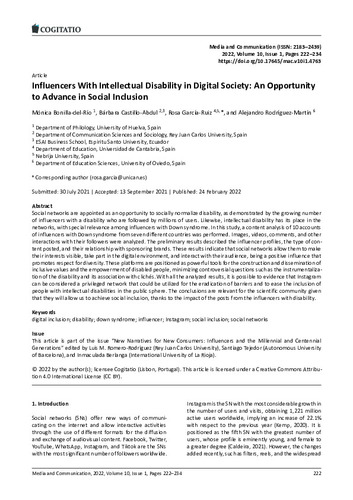Influencers with intellectual disability in digital society: an opportunity to advance in social inclusion
Autor(es) y otros:
Fecha de publicación:
Versión del editor:
Citación:
Descripción física:
Resumen:
Social networks are appointed as an opportunity to socially normalize disability, as demonstrated by the growing number of influencers with a disability who are followed by millions of users. Likewise, intellectual disability has its place in the networks, with special relevance among influencers with Down syndrome. In this study, a content analysis of 10 accounts of influencers with Down syndrome from seven different countries was performed. Images, videos, comments, and other interactions with their followers were analyzed. The preliminary results described the influencer profiles, the type of con‐ tent posted, and their relationship with sponsoring brands. These results indicate that social networks allow them to make their interests visible, take part in the digital environment, and interact with their audience, being a positive influence that promotes respect for diversity. These platforms are positioned as powerful tools for the construction and dissemination of inclusive values and the empowerment of disabled people, minimizing controversial questions such as the instrumentaliza‐ tion of the disability and its association with clichés. With all the analyzed results, it is possible to evidence that Instagram can be considered a privileged network that could be utilized for the eradication of barriers and to ease the inclusion of people with intellectual disabilities in the public sphere. The conclusions are relevant for the scientific community given that they will allow us to achieve social inclusion, thanks to the impact of the posts from the influencers with disability.
Social networks are appointed as an opportunity to socially normalize disability, as demonstrated by the growing number of influencers with a disability who are followed by millions of users. Likewise, intellectual disability has its place in the networks, with special relevance among influencers with Down syndrome. In this study, a content analysis of 10 accounts of influencers with Down syndrome from seven different countries was performed. Images, videos, comments, and other interactions with their followers were analyzed. The preliminary results described the influencer profiles, the type of con‐ tent posted, and their relationship with sponsoring brands. These results indicate that social networks allow them to make their interests visible, take part in the digital environment, and interact with their audience, being a positive influence that promotes respect for diversity. These platforms are positioned as powerful tools for the construction and dissemination of inclusive values and the empowerment of disabled people, minimizing controversial questions such as the instrumentaliza‐ tion of the disability and its association with clichés. With all the analyzed results, it is possible to evidence that Instagram can be considered a privileged network that could be utilized for the eradication of barriers and to ease the inclusion of people with intellectual disabilities in the public sphere. The conclusions are relevant for the scientific community given that they will allow us to achieve social inclusion, thanks to the impact of the posts from the influencers with disability.
ISSN:
Patrocinado por:
This work was conducted within the framework of Alfamed (Euro‐American Network of Researchers), with the support of the R+D Project Youtubers and Instagrammers: Media Competence in Emerging Prosumers (RTI2018–093303‐B‐I00), financed by the State Research Agency of the Spanish Ministry of Science, Innovation and Universities and the European Regional Development Fund.
Colecciones
- Artículos [37541]
- Ciencias de la Educación [1070]
- Investigaciones y Documentos OpenAIRE [8415]
Ficheros en el ítem





